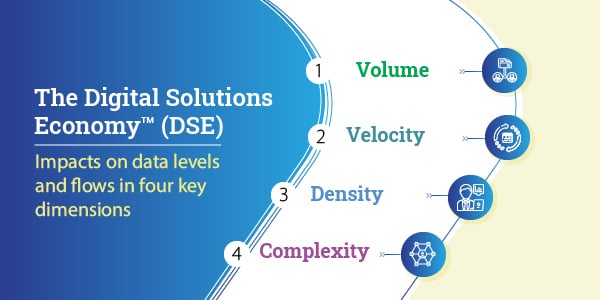As discussed in previous blog posts, the The Digital Solutions Economy™ (DSE) is continuing to disrupt conventional customer engagement business models by shifting away from one-off sales transactions and toward subscriptions, bundling and multi-faceted relationships. DSE is already transforming many B2C markets and is also rapidly making inroads into B2B scenarios as well.
This new installment in our on-going DSE series focuses on the overarching issues regarding how DSE is radically changing the nature of data flows that must be handled while at the same time driving up the importance of real-time responsiveness.
These impacts on data levels and flows can be grouped into four key dimensions of Volume, Velocity, Density, and Complexity.

- Volume: DSE business models inherently generate more data than traditional sales and fulfillment approaches. In DSE, deeper and broader levels of customer engagement give companies enhanced insights into what customers want, when they want it and how they want to pay for it. This offers major benefits in terms of opportunities to deepen customer loyalty and/or upsell with additional related offerings. But if your DSE processes can't keep up with the higher data volumes, not only will you lose these Insights to Action benefits; you may very well lose the customers too.
- Velocity: This is essentially a result of the real-time nature of DSE business models. As customers have more control over all aspects of the engagement process, their expectations for immediacy are increasing exponentially. For example, if a customer makes changes to their bundled services, purchases new entitlements, or reschedules upcoming deliveries, they expect to see the changes instantly reflected in their accounts. In addition, automated processes such as Internet of Things (IoT) devices, such as connected home exercise equipment, now are constantly sending updated data on user behaviors, which needs to be factored into providers' DSE processes in real-time to track usage and identify opportunities.
- Density: Because many DSE offerings involve bundling of multiple elements, such as a product purchase bundled with service contracts and/or consumables, customer accounts tend to accumulate much deeper levels of data that must be tracked and processed. The ability to "drill-down and drill-through" these deeper data elements is critical not only to understanding customer behavior but also for accounting compliance requirements. For example, a DSE contract may often include many different performance obligations (POBs) that must be tracked and accounted for in your revenue recognition reporting disclosures.
- Complexity: This aspect encompasses the challenges of putting all the pieces together for a healthy, high-functioning DSE business environment. Complexity can involve a wide range of factors spanning multiple areas, such as customer behavior trends (both individual and aggregated), performance metrics, product/services mix, margins and profitability. Addressing these complex issues often also requires integrating internally-generated data, such as incorporating AI data analysis and predictive analytics feeds.
In many ways, dealing with DSE's data flow escalation is like drinking from a fire hose while also trying to analyze the water quality and monitor your hydration levels in real time.
Fortunately, many of these DSE data challenges can be addressed using a range of interrelated applications and technologies within the SAP ecosystem. Key among these are Billing & Revenue Innovation Management (BRIM), SAP Analytics Cloud (SAC), and SAP Entitlement Management (EM), all of which can mesh seamlessly together within the SAP S/4HANA Intelligent Enterprise environment.
Bramasol works closely with SAP in helping customers configure and implement these solutions to meet their unique requirements, while also leveraging our Comply, Optimize, Transform™ paradigm to assure accounting compliance, sustained performance and scalability.
Check out the resources below for useful tips and tools for dealing with these emerging data challenges in the Digital Solutions Economy:
- Take a Holistic Approach to DSE - watch video Digital Solutions Economy Overview
- Design for Scalability - read blog Hyperscaling is Key to Successful Digital Transformation
- Incorporate Embedded Analytics - read blog Embedded Analytics are Key to DSE Success
- Leverage Comply, Optimize, Transform - read blog RISE with SAP is the Perfect Complement for Comply, Optimize, Transform

